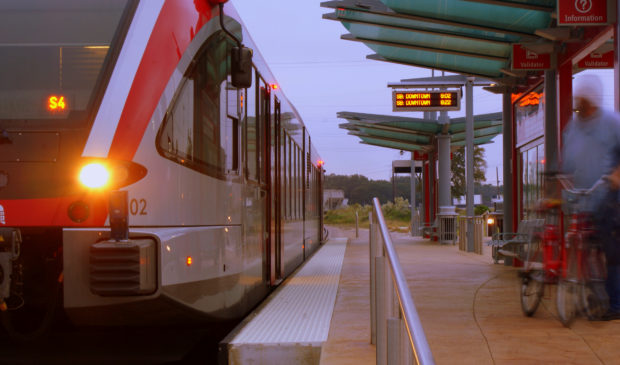Cap Metro to create 1,000 jobs over coming decade
Tuesday, November 23, 2021 by
Seth Smalley On Monday, the Capital Metropolitan Transportation Authority Board of Directors discussed its workforce retention plan, building on the discussion of labor shortages across the country, as well as the announcement last week that Capital Metro bus driver starting wages will increase to $22 per hour starting Jan. 1.
The wage increases, in part made possible by the federal infrastructure bill, begin to address the issues Capital Metro has had with hiring and retaining workers.
“Our goal is to put together a holistic strategy and action plan that will prepare us to operate the expanded services that we promised the community under Project Connect,” said Donna Simmons, executive vice president of administration.
Capital Metro said it needs to hire more than 100 bus operators in order to deliver on its current plan for a full-service schedule. Over the next decade, the agency expects to hire about 1,000 employees. The company has engaged Boston Consulting Group, a management consulting firm, to deal with attrition and hiring issues.
The firm is surveying current employees to gain insight on Capital Metro worker retention, in addition to gathering data on applicants who left in the middle of the hiring process to lessen the number of future dropouts.
In addition to creating a talent search team to be deployed to places like malls and farmers markets, Capital Metro is also changing the team leadership in charge of hiring bus operators and mechanics.
Simmons explained that they are seeking to shorten the hiring process, “so that we are able to get out in the community, take applications, do interviews and make job offers on the very same day. So that we’re not losing applicants to other employers, like Samsung or Tesla.”
The new Capital Metro marketing campaign, “It’s a thing around here,” will focus on horizontal and vertical mobility for employees. Having seen some of the unreleased campaign videos, Simmons described them as well done.
“Transit is a great career whether you remain a bus operator or mechanic or whether you decide you want to move to different levels or different types of jobs,” Simmons told board members.
The transit agency is also making efforts to develop employment pipelines by creating community contacts at Workforce Solutions, school districts, Austin Community College, local labor organizations and trade schools.
A consultant with BCG said that in addition to workforce size growth, the group is focusing on future skills that will be needed by the Capital Metro workforce, citing the example of electric vehicle mechanics versus diesel mechanics.
“It’s exciting that these jobs are being created,” said Ann Kitchen, Capital Metro board member and City Council member. “But also getting in the position like you all are doing to be proactive about it – that’s excellent.”
When asked if Capital Metro has equity goals, the organization said it plans to develop them over the next few months and bring them in front of the board in January.
Photo made available through a Creative Commons license.
The Austin Monitor’s work is made possible by donations from the community. Though our reporting covers donors from time to time, we are careful to keep business and editorial efforts separate while maintaining transparency. A complete list of donors is available here, and our code of ethics is explained here.
You're a community leader
And we’re honored you look to us for serious, in-depth news. You know a strong community needs local and dedicated watchdog reporting. We’re here for you and that won’t change. Now will you take the powerful next step and support our nonprofit news organization?






